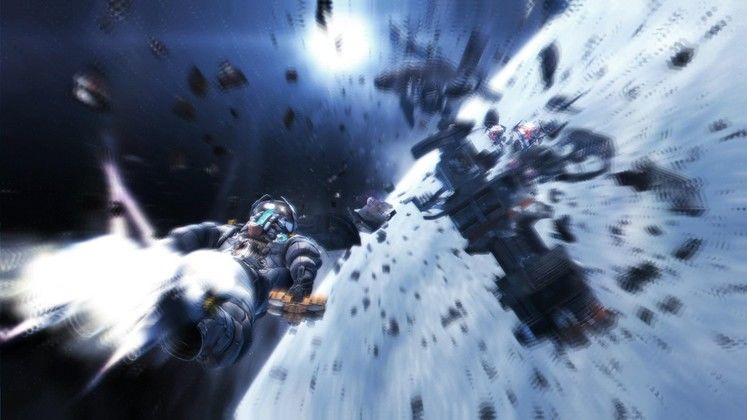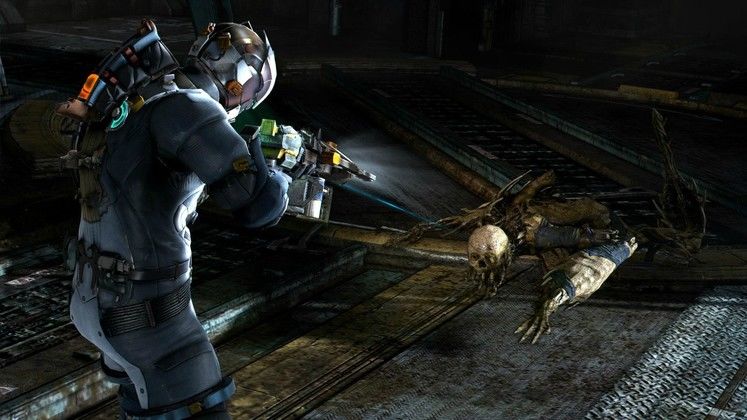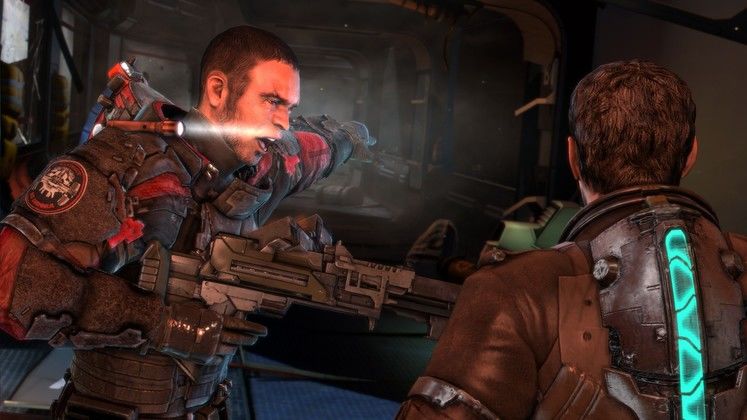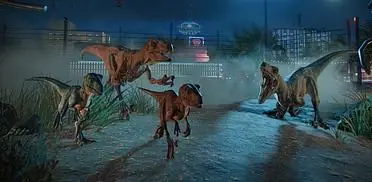Essentially, Visceral have ditched exactly what made the game unique, and no longer do you feel any sense of foreboding or dread as you wander through abandoned space corridors, as every corner is instead filled with a mundane wave of Necromorphs that desensitised superhero Isaac Clarke is so accustomed to killing he doesn't even flicker, instead croaking Nolan North-esque grunts and swears.
 |
| Isaac's jaunts into space look stunning, and are among the most hauntingly tranquil moments of the game. |
Turning the game into an explosive action adventure, complete with ripped-from-Uncharted-set-pieces and stunning environments isn't a negative criticism on its own. The narrative arch just about makes Isaac's journey from space engineer to action hero plausible, but the price we pay for Isaac's personal journey is a game that abandons what made the first two Dead Spaces standout, and instead replaces them with all-out action that is wholly derivative and does nothing to inspire or innovate.
Its most innovative feature feels like the weapon crafting system, but it's hard to praise that as creative design, such is the vehement aggression with which the microtransaction system intrinsically linked to it is shoved in Isaac's face. The argument that you can just ignore microtransactions if you don't want to use them is often bandied about, and it's a valid one, but Visceral have made ignoring it as hard as possible.
You're low on ammo and health, and have been at this checkpoint four times now. You don't have many spare parts, but in front of you is a Bench. Upon accessing it, you see that you just don't have enough spare parts to craft that all-important medipack. The shiny microtransaction button looms large, beckoning you to ease your troubles for just a few quid. The pressure to succumb to that temptation is purposefully great, and it's hard not to be ripped out of Dead Space's universe by the sound of jangling coins in your pocket and EA's cash registers ca-chinging.
That's not to say the crafting system is completely useless - it does its purpose in allowing you to craft some truly cool weapons, linking the different elements into a dual-firing beast. You can create a shotgun with a shockwave attached, perfect for close encounters, or attach a grenade launcher to a buzzsaw for maximum destruction. Working out which parts work best is somewhat important, but really all you need is two weapons capable of the most destruction.
That's because, unfortunately, the nature of the combat means you never really need to push this system to its experimental limits, and you can comfortably stick with the same two weapons throughout, upgrading them and perfecting them, instead of creating an arsenal of Frankenstein weaponry that needs to be used for specific encounters.
 |
| That necromorph looks vulnerable, but it's probably still capable of moving 50mph. |
Just as Isaac sees himself as the universe-saving-action-hero, every Necromorph in the game has also apparently been infected with Arnie-Sly-itus, and whatever their specific form, they come charging at you at breakneck speed. Even if you tactically shoot out their legs, they still come charging, and while the result is frantic and fast-paced combat, it soon becomes a repetitive sludge, never making you adapt or change as the game progresses. Isaac is no longer an engineer thrown into combat - a thinking man turned into an action man - but an action man who has no need for thinking.
Combat's even worse on the thankfully few occasions that humans get involved, largely because the systems just haven't been designed for such an enemy. As a result, the impact of weapons feel extremely muted, with plasma cutters and buzz saws doing bafflingly little to human flesh on some occasions, then inexplicitly causing massive gore on the next round.
Stomping on human corpses to get items also makes little sense, and contributes to the feeling that the narrative decisions and action decisions didn't quite happen in harmony. Isaac's character arch may explain it, but the other elements don't, and shooting humans just feels off when you're using systems specifically designed for alien foes.
The cover system also feels shoehorned in, adding little to the game and doing nothing to stop the ever growing shoot-by-numbers feel. Likewise, there's out-of-place turret sections and clunky ship-flying segments, neither of which seem to add anything, and giving the overall impression that Visceral may have just been trying to cram too much in, instead of honing and perfecting a few key elements like they did in the first two games.
Outside of the combat, Isaac does still stay true to his engineering roots. The main way the game progresses is by sending you through different areas of space - first through different abandoned space wrecks, before you're greeted with the icy planet and the blizzards that rule its surface. Despite the pacing of many of these quests feeling too slow, the fact they make you think - even if it's only a little bit, solving simple puzzles - means they're a welcome and positive refrain from the mindless shooting.
The game's ultimate saving grace is the overarching story, which does do justice to the complex and fleshed-out plots established in past Dead Space volumes, offering an epic space opera that provides commentary on religion and conformity within our society to a backdrop of planetary destruction. The subplots throughout hamper rather than hinder, though, and Isaac's love triangle is sure to cause a few moments of cringe, such is the banality of the dialogue and complete lack of emotional conviction created by any of the characters involved.
 |
| Imagine the most mundane thing you can think of, and he's probably saying it. |
Dead Space 3 is a game that looks sleek, is polished to the last minute detail, and is full of some stunning set-pieces. But beneath those shiny distractions, it lacks any real sense of soul, slotting in among a raft of other third-person shooters, never causing you to feel anything other than short bursts of panic and relief.
DEAD SPACE 3 VERDICT
It’s shifted the focus to action without fully understanding how to make an action game work, resulting in a game that develops slowly from start to finish, and, at least as far as the combat goes, never does anything to surprise you. I was very sceptical before I played Dead Space 3, but I oh-so-desperately wanted to love it. Unfortunately, it never does anything to earn moderate positive feelings, let alone something approaching love, and instead it offers a vapid experience: one that looks great and ticks boxes, but one that, at the end of day, will leave you feeling emptier than any abandoned vessel Isaac happens across.
TOP GAME MOMENT
The conclusion. Not because it meant the game ending, but because of how satisfying and epic it is.




